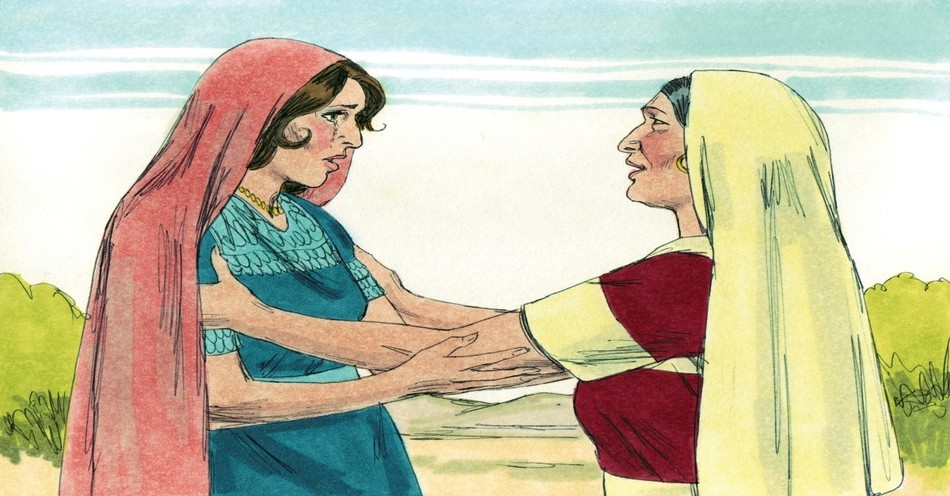Naomi didn’t live an easy life. Plagued by drought, death, and destitution, she turned bitter after many years of hardship. But her story, like many in the Bible, doesn’t end in misery. Naomi finds her way to sweetness again with her daughter-in-law Ruth, proving that God can take the most desolate situation and make it beautiful.
What is Naomi's Story in the Bible?
Naomi is a significant figure in the Book of Ruth in the Bible. She is an Israelite woman from Bethlehem in Judah who, due to a famine, relocates with her husband, Elimelech, and their two sons to Moab, a neighboring country. Unfortunately, Naomi faces tremendous personal losses: her husband dies, followed by the death of her two sons, who had married Moabite women named Orpah and Ruth.
After these tragedies, Naomi returns to Bethlehem, as she hears that the famine has ended there. Although initially both her daughters-in-law begin the journey with her, Naomi urges them to return to their own mothers' homes in Moab. Orpah eventually returns, but Ruth refuses to leave Naomi, uttering the famous pledge, "Where you go I will go, and where you stay I will stay. Your people will be my people and your God my God." (Ruth 1:16)
Back in Bethlehem, Naomi and Ruth face poverty and insecurity, leading Ruth to glean barley in the fields of Boaz, a relative of Naomi’s late husband. Naomi plays a crucial role in guiding Ruth in her interactions with Boaz, eventually leading to marriage between Ruth and Boaz. This marriage secures Naomi’s and Ruth’s future and integrates Ruth into the community of Bethlehem.
Naomi is often remembered for her role in this story of loyalty, love, and redemption. She is seen as a figure of resilience and faith, navigating through her profound losses and playing a pivotal role in the lineage leading to King David and, ultimately, according to Christian tradition, to Jesus.
Naomi's Story in Ruth
Naomi’s story is told throughout the four chapters of the book of Ruth. The first book tells the beginning of Naomi’s story, her family’s move to Moab, and the men’s tragic deaths. Here, Naomi finds herself in a foreign land without her husband and sons. After hearing the famine ended in Judah, Naomi returns to her homeland. She tells her daughters-in-law to return to their families. She believes they would be better off that way instead of consenting to the life of a poor widow. Orpah listens to Naomi’s urging, but Ruth insists on following her mother-in-law.
In the second chapter, Ruth begins gleaning in a nearby field to provide for herself and Naomi. The field happened to belong to Boaz, who happened to be a relative of Naomi’s deceased husband, Elimelek.
Boaz notices Ruth in the field and asks about her. The overseer tells Boaz Ruth returned from Moab with her mother-in-law, Naomi. Being impressed by Ruth’s dedication, Boaz tells her to continue working in his field, emphasizing she will be safe amongst his workers. Ruth returns home to Naomi with a large amount of barley and tells the story of her conversation with Boaz. Naomi recognizes Boaz as the family’s kinsman-redeemer. Christianity.com explains a kinsman-redeemer as “a male relative who helps a weaker relative in need or danger. . . [someone who] delivers, rescues, and in many cases, redeems property.”
The third chapter of Ruth begins with Naomi’s encouragement to marry Boaz. She gives Ruth detailed instructions on how to “propose” to him. Ruth follows the directions, and Boaz immediately understands what Ruth asks of him. He tells her there is another living kinsman-redeemer, so Boaz needs to check with him before he can marry Ruth. Ruth goes home to Naomi and relays the message. Naomi tells her to be patient and wait to see what happens between the two men.
In Ruth 4, Boaz goes to the city gate to wait for the other kinsman-redeemer. When he sees him approaching, he tells him that Naomi is selling a piece of their late relative’s land. At first, the man agrees to purchase the land, but when Boaz adds that the relative will acquire Ruth as a wife, the man changes his mind. He tells Boaz to redeem the land, and the situation is settled. Ruth 4:9 says, “Then Boaz announced to the elders and all the people, “Today you are witnesses that I have bought from Naomi all the property of Elimelek, Kilion, and Mahlon.”
Meaning and Significance of Naomi's Name
The name Naomi, originating from Hebrew, is generally understood to mean "pleasantness" or "my delight." In the Bible, Naomi herself remarks on the meaning of her name in a poignant scene upon returning to Bethlehem. After experiencing severe hardship and loss, she tells the townspeople to call her "Mara" instead, which means "bitter," suggesting a contrast to the original meaning of her name, "Naomi," reflecting her feelings of sorrow after the deaths of her husband and sons. This interplay of meanings highlights the transformation of her life experiences and her perception of them.
During her tribulation, losing her husband and sons, Naomi feels the opposite of her name. When she returns to Judah, her neighbors don’t even recognize her. Gone is her pleasantness and sweetness due to the devasting losses that occurred. Ruth 1:20 reads, “Don’t call me Naomi,” she told them. “Call me Mara, because the Almighty has made my life very bitter.” After the people question her identity, she tells them to call her “Mara” instead to match the bitterness of her life.
Crosswalk.com emphasizes that “Name changes in the Bible have more of an extreme significance than simply getting a legal name change now. A name change determined a person’s character, life circumstances, and purpose.” Naomi blames her circumstances on God. In Ruth 1:21, she says, “I went away full, but the LORD has brought me back empty. Why call me Naomi? The LORD has afflicted me; the Almighty has brought misfortune upon me.”
Why Did Naomi Want Ruth and Orpah to Go Home?
After her sons’ passing, Naomi found herself in a difficult situation. In these times, society didn’t set women up for independence. Instead, they relied on the men in their lives for financial and physical security. On the outside, it didn’t look like Naomi’s life held much promise. Without men in her life, she didn’t have a way to provide for herself or her daughters-in-law.
Biblestudytools.com states, “During biblical times, women relied on men for survival, to provide a roof over their heads and put food on the table. Naomi knew it would be difficult for three widowed women to make a life of their own. Women married for necessity more than desire.” Naomi’s outlook was bleak. She didn’t want that same life for her daughters-in-law.
Naomi emphasized that even if she gave birth to new sons immediately, she couldn’t expect Ruth and Orpah to wait until the boys were old enough to marry. Instead, she urged her daughters-in-law to return to their families and remarry. New husbands could provide for their needs and help them lead comfortable lives. Moving to a foreign land without means would be the opposite of comfortable.
Why Did Naomi Encourage Ruth to Marry Boaz?
Because Boaz was closely related to Naomi’s deceased husband, he was known as the family’s kinsman-redeemer. Baker’s Evangelical Dictionary of Biblical Theology explains that a kinsman-redeemer, “according to various laws found in the Pentateuch, had the privilege or responsibility to act for a relative who was in trouble, danger, or need of vindication.”
Ruth was in a tricky situation. As a widow, she didn’t have someone to care for her needs and protect her. That’s why Naomi came up with a plan. She told Ruth to dress up and go to the threshing floor. She encouraged Ruth to wait until Boaz had finished eating and drinking and lay down for the night. Ruth was to uncover his feet and lie down. While the direction may seem strange today, it was customary for the time.
Since another relative was a closer kinsman-redeemer, Boaz needed to check with him before accepting Ruth’s request. When the other man turned down the prospect of marrying Ruth, Boaz publicly declared she would be his wife. In marrying Ruth, Boaz helped preserve Elimelek’s family and became part of the lineage of Jesus, the ultimate kinsman-redeemer.
After Boaz and Ruth were married, Ruth conceived and bore a son named Obed. Matthew Henry’s Commentary states, “The good women that were at the labor when this child was born congratulated Naomi upon it more than either Boaz or Ruth, because she was the match-maker, and it was the family of her husband that was hereby built up.” Ruth and Naomi were no longer desolate. Besides a new husband and son-in-law, a male heir was born. In the future, he could take care of his mother and grandmother in their old age.
Naomi navigated many challenges during her life. But God also redeemed her story. Think of all the fields that must have existed in Bethlehem, and her daughter-in-law found herself on the one person’s land who could make a difference in her story. Ruth became Boaz’s wife through God's orchestration, and Naomi found a home. She also gained a son when Ruth gave birth to Obed. Jesus, the ultimate kinsman-redeemer, was born many years later through this lineage. Can there be a better ending to a story?
Cover Photo Credit: Getty Images/BibleArtLibrary

Jenna Brooke Carlson is an elementary dual language teacher in the Chicago suburbs. As a member of American Christian Fiction Writers and Word Weavers, she enjoys spending time with other writers and perfecting her craft. Her debut novel, Falling Flat, spreads the message that healing can occur, even after tragedy. Along with writing, she’s pursuing her dreams of creating a community of brave young women, who she can encourage to live out their dreams amid challenges and imperfection. Her days are busy, but she’s determined she can conquer anything with a fuzzy blanket and a hot cup of tea. To find out more about Jenna, visit her website at jennabrookecarlson.com.
This article is part of our People of Christianity catalog that features the stories, meaning, and significance of well-known people from the Bible and history. Here are some of the most popular articles for knowing important figures in Christianity:
How Did the Apostle Paul Die?
Who are the Nicolaitans in Revelation?
Who Was Deborah in the Bible?
Who Was Moses in the Bible?
King Solomon's Story in the Bible
Who Was Lot's Wife in the Bible?
Who Was Jezebel in the Bible?
Who Was the Prodigal Son?

.jpg)

.jpg)
